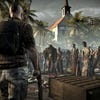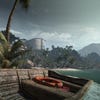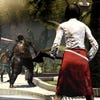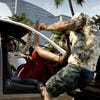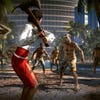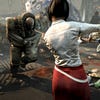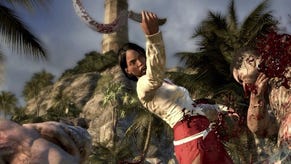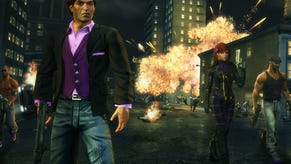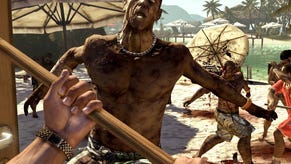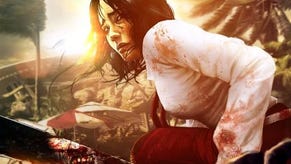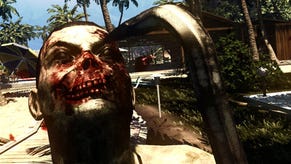Dead Island
Trailer trash?
Lifeguard rescued, a mysterious voice on the radio tells us that the shack is unsafe and instructs us to clear a route to a more defensible location – a lifeguard observation tower. Hacking through undead, we graduate to a sledgehammer and then a fire axe.
There are sharp and blunt melee weapons which need to be used with consideration for the type of zombie attacking, and its hit zones. Break the legs of one of the faster-moving cadavers, for example; sever the arm of an armed assailant; or throw whatever you have to take out an exploding "suicide zombie" at range.
Dead Island has a level of realism to its weaponry, although it's a cartoon kind of realism. You might pick up a dead cop's pistol or shotgun and crack off a few shots with his remaining ammo, if you're lucky, but you won't find RPGs or machine guns lying around this vacation spot.
Instead, you'll gather crafting materials – carrying an almost limitless amount, although there will be an inventory limit for weapons – like wires, belts, boxes and batteries, and use them to modify what you find at the workbenches according to discovered blueprints. You might fashion an electrified machete to add shock damage to your carvery, or tape explosives to throwing knives, creating makeshift sticky bombs.
Your other tools will be skills, and we're shown two of the tank's: a "skullcrusher" finishing move (stamp viciously on the head of a downed foe) and Fury, a rage mode with a long cooldown for desperate situations. Trigger Fury, and the screen takes on a monochrome wash with enemies highlighted in splashes of red while you enter an invulnerable critical-hit frenzy, chaining attacks thoughtlessly.
In normal combat, however, you need to manage your stamina; run out and you won't be able to run, kick or swing at all. Health and stamina increase as you level up, but there are no other stats, and no equipment beyond weaponry. Dead Island is a very light RPG, but it definitely is an RPG.
And like any good action RPG, it features online co-op for four players. These can be in any combination of class, and it's drop-in, drop-out, with friends able to join each others' games at will, presumably at your own risk of plot spoilers. There'll be a matchmaking system for finding other players at your level, location, or stage in the storyline, too.
That story won't differ significantly across the characters, but will encompass "hundreds" of quests and optional side-quests across a diverse island. Judging by a teaser trailer we're shown, you'll strike out from the beach to explore the hotel, city streets choked with abandoned cars, an aeroplane crash site – possibly the jet we see screaming in over our heads towards the end of the demo – and thick jungle.
You'll encounter other survivors who will trade something for your assistance (your immunity to the undead plague automatically confers the status of a valued mercenary on you). There are factions with different interests. Help one guy fix a car, and you'll be able to use it to get around the island, giving your friends a ride if playing in co-op.
Does this violent, sprawling survivalist adventure sound like the game Dead Island's trailer painted in your head? Possibly not, but I don't think those three minutes of film necessarily misrepresented it, either.
Setting the ethical brouhaha about the trailer's shocking imagery aside, there's another reason it stirred the games world up. Here was an original concept, simply and powerfully conveyed, in the form of a game from a smaller publisher and developer. Here was a game that came without the baggage of expectation, franchising, pigeonholing or strung-out hype.
The most exciting thing about Dead Island was that it was an unknown quantity, and so was free to just be itself. And the most heartening thing about this demo – not startlingly innovative, but mustering a personality and theme all its own, despite those overworked zombies – is that it seems to be doing just that.

